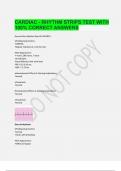Tachy rhythms - Study guides, Class notes & Summaries
Looking for the best study guides, study notes and summaries about Tachy rhythms? On this page you'll find 100 study documents about Tachy rhythms.
Page 4 out of 100 results
Sort by
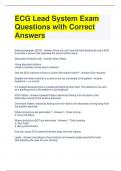
-
ECG Lead System Exam Questions with Correct Answers
- Exam (elaborations) • 10 pages • 2024
-
Available in package deal
-
- $12.99
- + learn more
ECG Lead System Exam Questions with Correct Answers Electrocardiogram (ECG) - Answer-Since you can't see the heart beating we use a ECG to provide a picture that replicates the actual cardiac issue. Myocardial Infraction (MI) - Answer-Heart Attack -Have abnormal rhythms. -Death of cardiac muscle due to ischemia Doe the ECG machine monitor or control the hearts rhythm? - Answer-Only monitors Straight line when machine is turned on but not connected to the patient - Answer- Isoelect...
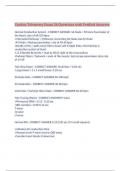
-
Cardiac Telemetry Exam 56 Questions with Verified Answers,100% CORRECT
- Exam (elaborations) • 8 pages • 2023
-
- $10.99
- + learn more
Cardiac Telemetry Exam 56 Questions with Verified Answers Normal Conduction System - CORRECT ANSWER -SA Node = Primary Pacemaker of the Heart, rate of 60-100 bpm -Internodal Pathways = Pathways connecting SA Node and AV Node -AV Node = Backup pacemaker, rate of 40-60 bpm -Bundle of His = splits nerve fibers down Left & Right Sides, His-Purkinje is conduction system of heart -L & R Bundle Brancehs = lead to left & right of the myocardium -Purkinje Fibers / Network = ends of the muscle, la...
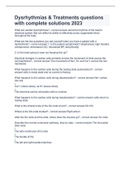
-
Dysrhythmias & Treatments questions with complete solutions 2023
- Exam (elaborations) • 11 pages • 2023
- Available in package deal
-
- $12.99
- + learn more
Dysrhythmias & Treatments questions with complete solutions 2023What are cardiac dysrhythmias? abnormal rhythms of the heart's electrical system that can affect its ability to effectively pump oxygenated blood throughout the body What are the two questions you ask yourself when you have a patient with a dysrhythmia? 1. Is the patient symptomatic? (diaphoresis, light headed, unresponsive, decreased LOC, decreased BP, tachy/brady) 2. Is the heart going to wear out keeping this up? ...
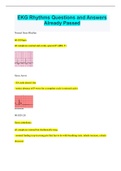
-
EKG Rhythms Questions and Answers Already Passed
- Exam (elaborations) • 21 pages • 2023
-
Available in package deal
-
- $9.49
- + learn more
EKG Rhythms Questions and Answers Already Passed Normal Sinus Rhythm 60-100 bpm all complexes normal and evenly spaced (P, QRS, T) Sinus Arrest - SA node doesn't fire - notice absence of P-wave for a complete cycle (a missed cycle) 00:0201:28 Sinus arrhythmia all complexes normal but rhythmically irreg - normal finding (esp in young pts) that has to do with breathing (rate: inhale-increase, exhale-decrease) Sinus Bradycardia <60 normal sinus rhythm Sinus Tachycardia >100 (100-150) no...
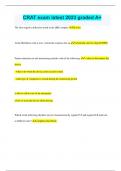
-
CRAT exam latest 2023 graded A+
- Exam (elaborations) • 9 pages • 2023
-
Available in package deal
-
- $9.99
- + learn more
CRAT exam latest 2023 graded A+ The first negative deflection noted in the QRS complex Q wave Atrial fibrillation with a slow ventricular response has an ventricular rate less than 60 BPM Patient education in self-monitoring includes with of the following: - when to disconnect the device - what to do when the device emits an alert sound - what type of symptoms to record during the monitoring period x who to call in case of an emergency x how to wear the device while driving Which of the foll...
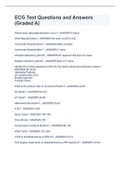
-
ECG Test Questions and Answers (Graded A)
- Exam (elaborations) • 5 pages • 2023
-
Available in package deal
-
- $8.99
- + learn more
Where does atrial depolarization occur? - ANSWER-P wave Atrial Repolarization? - ANSWER-Not seen on ECG strip Ventricular Depolarization? - ANSWER-QRS complex Ventricular Repolarization? - ANSWER-T wave Absolute Refractory period? - ANSWER-ST segment and front of t wave Relative refractory period? - ANSWER-Back of T wave Identify the normal sequence of flow for the heart's electrical conduction system - ANSWER-SA Node Internodal Pathway AV node/bundle of his Bundle branche...
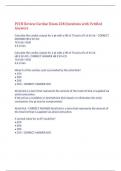
-
PCCN Review Cardiac Exam 238 Questions with Verified Answers,100% CORRECT
- Exam (elaborations) • 83 pages • 2024
-
Available in package deal
-
- $13.49
- + learn more
PCCN Review Cardiac Exam 238 Questions with Verified Answers Calculate the cardiac output for a pt with a HR of 70 and a SV of 65 ml. - CORRECT ANSWER HR X SV=CO 70 X 65= 4550 4.6 L/min Calculate the cardiac output for a pt with a HR of 70 and a SV of 65 ml. HR X SV=CO - CORRECT ANSWER HR X SV=CO 70 X 65= 4550 4.6 L/min What % of the cardiac cycle is provided by the atrial kick? • 15% • 20% • 30% • 35% - CORRECT ANSWER 20% Atrial kick is a term that represents the am...
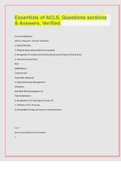
-
Essentials of ACLS, Questions sections & Answers, Verified.
- Exam (elaborations) • 6 pages • 2023
-
Available in package deal
-
- $8.49
- + learn more
Essentials of ACLS, Questions sections & Answers, Verified. Core Competencies (this is a long one - but just overview) 1. Good CPR skills 2. Effective basic airway skills (non-invasive) 3. Recognition of cardiac arrest rhythm & pre-arrest rhythms (fast & slow) 4. Electrical interventions AED Defibrillation Cardioversion Pacemaker (external) 5. Advanced Airway Management Intubation End-tidal CO2 knowledge & use Tube stabilization 6. Recognition of 12-lead signs of acute MI 7. ...
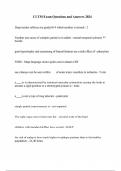
-
CLTM Exam Questions and Answers 2024
- Exam (elaborations) • 90 pages • 2024
-
Available in package deal
-
- $13.00
- + learn more
Deep tendon reflexes are graded 0-4 which number is normal - 2 Number one cause of complex partial sz in adults - mesial temporal sclerosis ** boards gum hypertrophy and coarsening of foacial features are a side effect of - phenytoin FMRI - Maps language motor spikes and evaluates CBF eeg changes can be seen within of acute injury resulting in ischemia - 5 min a sz is characterized by sustained muscular contraction causing the body to assume a rigid position or a stereotyped posture is - to...

Do you wonder why so many students wear nice clothes, have money to spare and enjoy tons of free time? Well, they sell on Stuvia! Imagine your study notes being downloaded a dozen times for $15 each. Every. Single. Day. Discover all about earning on Stuvia



